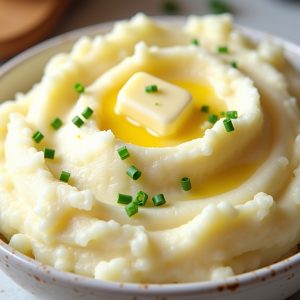
AI generated image
Chef's Tip
For the creamiest mashed potatoes without a gluey texture, avoid overworking them. Use a ricer or food mill for the smoothest results, or a potato masher for a more rustic texture. Never use a food processor or blender, which will rupture too many starch cells and create a gummy consistency.
Instructions
- Place peeled and cubed potatoes in a large pot and add cold water to cover by 1 inch. Add 1 tablespoon salt.
- Bring to a boil over high heat, then reduce to a simmer. Cook until potatoes are tender when pierced with a fork, about 15-20 minutes.
- Meanwhile, in a small saucepan, combine milk and cream. Heat over low heat until warm but not boiling. Keep warm.
- Drain potatoes thoroughly in a colander, then return them to the hot, dry pot. Place over low heat for 1-2 minutes, stirring occasionally, to evaporate excess moisture.
- Remove from heat. If using a potato ricer or food mill, process potatoes directly back into the pot. Otherwise, mash directly in the pot with a potato masher until desired consistency is reached.
- Add butter pieces and stir gently until melted and incorporated.
- Gradually add warm milk and cream mixture, stirring after each addition until absorbed. You may not need all the liquid depending on desired consistency.
- Season with salt and white pepper to taste, stirring gently to combine.
- Serve immediately, garnished with chopped chives if desired.
Plating
Serve mashed potatoes in a warmed serving bowl with a decorative pat of butter on top that slowly melts into the potatoes. For individual servings, create a well in the center of each portion using the back of a spoon, which can hold additional gravy or butter. Garnish with a sprinkle of finely chopped chives or a light dusting of paprika for color.
Storage & Reheating
Leftover mashed potatoes can be refrigerated in an airtight container for up to 3 days. Reheat in a covered saucepan over low heat, stirring occasionally and adding a splash of milk or cream if they seem dry. Alternatively, heat in the microwave on medium power, stirring halfway through. Mashed potatoes can also be frozen for up to 1 month; thaw overnight in the refrigerator before reheating.
About This Recipe
Mashed potatoes have been a cornerstone of New England cooking since early colonial times, prized for their ability to stretch meals and provide comforting sustenance during long winters. This recipe pays homage to the classic preparation served at Boston's landmark restaurants, where generous amounts of butter and a careful mashing technique create a memorable side dish. The use of both milk and cream provides richness while maintaining a silky, spoonable texture.
